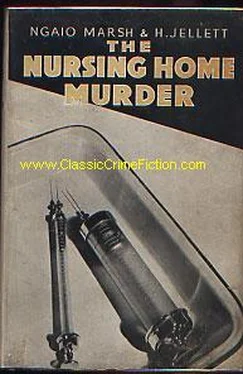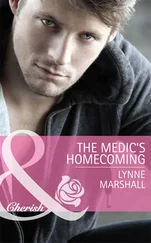Ngaio Marsh - The Nursing Home Murder
Здесь есть возможность читать онлайн «Ngaio Marsh - The Nursing Home Murder» — ознакомительный отрывок электронной книги совершенно бесплатно, а после прочтения отрывка купить полную версию. В некоторых случаях можно слушать аудио, скачать через торрент в формате fb2 и присутствует краткое содержание. Жанр: Классический детектив, на английском языке. Описание произведения, (предисловие) а так же отзывы посетителей доступны на портале библиотеки ЛибКат.
- Название:The Nursing Home Murder
- Автор:
- Жанр:
- Год:неизвестен
- ISBN:нет данных
- Рейтинг книги:5 / 5. Голосов: 1
-
Избранное:Добавить в избранное
- Отзывы:
-
Ваша оценка:
- 100
- 1
- 2
- 3
- 4
- 5
The Nursing Home Murder: краткое содержание, описание и аннотация
Предлагаем к чтению аннотацию, описание, краткое содержание или предисловие (зависит от того, что написал сам автор книги «The Nursing Home Murder»). Если вы не нашли необходимую информацию о книге — напишите в комментариях, мы постараемся отыскать её.
The Nursing Home Murder — читать онлайн ознакомительный отрывок
Ниже представлен текст книги, разбитый по страницам. Система сохранения места последней прочитанной страницы, позволяет с удобством читать онлайн бесплатно книгу «The Nursing Home Murder», без необходимости каждый раз заново искать на чём Вы остановились. Поставьте закладку, и сможете в любой момент перейти на страницу, на которой закончили чтение.
Интервал:
Закладка:
“It’s a Miss O’Callaghan asking for you,” he said stolidly.
“Miss—? Who the devil—? Oh, all right. Now what’s in the wind, do you suppose?”
“Send her up,” said Fox to the telephone. “I’d better push off, sir,” he added.
“I suppose you had. This is all very rum — very rum indeed.”
Fox departed. Alleyn knocked out his pipe, opened the window, and sat behind the desk. A woman’s voice sounded in the passage outside. The door was opened by a police-constable, who said:
“Miss O’Callaghan, sir,” and withdrew.
Ruth O’Callaghan walked into the room. She appeared to be dressed in a series of unrelated lengths of material. Her eye-glasses were canted over the top angle of her enormous nose. Her handbag and umbrella, wedded by an unhappy confusion of cords and leather thongs, dangled from a gaunt wrist. Her face, exclusive of the nose, was pale. She seemed to be grievously agitated.
Alleyn rose and waited politely.
“Oh!” said Ruth, catching sight of him. “Oh!” She came towards him at a kind of gallop and held out the hand that was encumbered with the umbrella and handbag. Alleyn shook it.
“How do you do?” he murmured.
“So good of you to see me,” Ruth began. “I know how busy you must be. The statistics of crime are so appalling. Too kind.”
“I am making no arrests this afternoon,” said Alleyn gravely.
She gazed at him dubiously and then broke into a sort of whooping laugh.
“Oh, no, no, no,” said Ruth. “That’s very funny — no, of course, I didn’t suppose— ” She stopped laughing abruptly and looked disconcertingly lugubrious.
“No,” she repeated. “But it is kind, all the same, when I expect you think I’m a jolly old nuisance of an interfering woman.”
“Do sit down,” said Alleyn gently, and pulled forward a. chair. Ruth shut up rather like a two-foot rule. He pushed the chair under her and returned to his own. She leant forward, resting her elbows on his desk, and gazed earnestly at him.
“Mr. Alleyn,” Ruth began, “what is this dreadful, dreadful suspicion about my brother’s death?”
“At the moment, Miss O’Callaghan, it can scarcely be called a suspicion.”
“I don’t understand. I’ve been talking to my sister-in-law. She said some dreadful things to me — terrible— appalling. She says my brother was”—Ruth drew in her breath noisily and on the crest of the intake uttered the word “murdered.”
“Lady O’Callaghan attaches a certain amount of importance to threatening letters which were sent to Sir Derek. You have heard of these letters, I expect.”
“You mean from those horrible anarchist people? Of course, I know they behaved very badly, but Derry — my brother, you know — always said they wouldn’t do anything, and I’m quite certain he was right. Nobody else could have any reason for wishing him harm.” (“She hasn’t heard about the other letters, then,” thought Alleyn.) “Everybody adored him, simply adored him, dear old boy. Mr. Alleyn, I’ve come to beg you not to go on with the case. The inquest was bad enough, but the other — the — you know what I mean. I can’t endure the thought of it. Please — please, Mr. Alleyn— ” She fumbled desperately in the bag and produced a colossal handkerchief.
“I’m so sorry,” said Alleyn. “I know it’s a beastly idea, but just think a little. Does it matter so much what they do to our bodies when we’ve finished with them? I can’t think so. It seems to me that the impulse to shrink from such things is based on a fallacy. Perhaps it is impertinent of me to speak so frankly.” Ruth gurgled and shook her head dolefully. “Well then, suppose there was no post-mortem, what about your feelings then? There would always be an unscotched suspicion whenever you thought of your brother.”
“He was ill. It was his illness. If only he had followed my advice! Mr. Alleyn, I have a friend, a brilliant young chemist, a rising man. I consulted him about my brother and he — generously and nobly — gave me a wonderful remedy, ‘Fulvitavolts,’ that would have cured my brother. I begged him to take it. It would have cured him; I know it” would. My friend assured me of it and he knows . He said— ” She broke off abruptly and darted a curiously frightened glance at Alleyn. “My brother always laughed at me,” she added quickly.
“And he refused to try this ‘Fultitavolts’?”
“Yes — at least — yes, he did. I left the tablets there but, of course — he just laughed. My sister-in-law is not very— ” Here Ruth floundered unhappily. “I’m sure he didn’t take them.”
“I see. People are generally very conservative about medicine.”
“Yes, aren’t they?” agreed Ruth eagerly and then stopped again and blew her nose.
“The lack of interest shown in chemical research must be very discouraging to a young man like your friend,” Alleyn went on. “I know a brilliant fellow— only twenty-five — who has already— ” He stopped and bent towards her. “I suppose we can’t possibly be speaking of the same person?” ‘ Ruth beamed at him through her tears.
“Oh no,” she assured him.
“Now, how do you know, Miss O’Callaghan?” said Alleyn gaily. “I’m a very great believer in coincidence. My man is James Graham.”
“No, no.” She hesitated again, oddly, and then in another burst of confidence: “I’m talking about Harold Sage. Perhaps you’ve heard of him too? He’s getting quite famous. He’s — he’s practically thirty.”
“The name seems to strike a chord,” lied Alleyn thoughtfully. The desk telephone rang.
“Will you excuse me?” he asked her, and took off the receiver.
“Hullo? Yes, speaking. Yes. Yes. I see. Thank you very much. I’m engaged at the moment, but if I may I’ll come round and see you to-morrow? Right.” He hung up the receiver. Ruth had just got to her feet.
“I mustn’t keep you, Mr. Alleyn. Only before I go— please, please let me beg you to go no further with these investigations. I’ve — I’ve got a reason — I mean I’m so sure Derry died naturally. It is all so dreadful. If I could be sure you were satisfied— ” She made an ineffectual movement with her hands, a clumsy gesture of entreaty. “Tell me you’ll go no further!” begged Ruth.
“I am extremely sorry,” said Alleyn formally, “but that would be impossible. The post-mortem has already been held. That message gave me the result.”
She stood gaping at him, her mouth half open, her big hands clutching at her bag.
“But what — what is it? What do they say?”
“Your brother died of an overdose of a dangerous drug,” said Alleyn.
She stared at him in utter dismay and then, without another word, turned and blundered out of the room.
Alleyn wrote the name “Harold Sage” in a minute notebook that he carried. Having done so, he stared at it with an air of incredulity, sighed, shut up his book and went to find Fox.
CHAPTER VIII
Hyoscine
Tuesday, the sixteenth. Afternoon.
On the following afternoon, five days after his death, Derek O’Calaghan was buried with a great deal of pomp and ceremony. Alleyn was right about the funeral — there was no demonstration from the late Home Secretary’s obscure opponents, and the long procession streamed slowly down Whitehall without disturbance. Meanwhile the inquest had been resumed and concluded. After hearing the pathologist’s and the analyst’s report, the jury returned a verdict of murder against “a person or persons unknown.” Alleyn had had a few words in private with the pathologist before the inquest opened.
“Well,” said the great man, “there wasn’t much doubt about the hyoscine. The usual dose is a hundredth to a two-hundredth of a grain. My calculations, based on traces of hyoscine found in the organs, show that more than a quarter of a grain had been given. The minimum lethal dose would be something very much less.”
Читать дальшеИнтервал:
Закладка:
Похожие книги на «The Nursing Home Murder»
Представляем Вашему вниманию похожие книги на «The Nursing Home Murder» списком для выбора. Мы отобрали схожую по названию и смыслу литературу в надежде предоставить читателям больше вариантов отыскать новые, интересные, ещё непрочитанные произведения.
Обсуждение, отзывы о книге «The Nursing Home Murder» и просто собственные мнения читателей. Оставьте ваши комментарии, напишите, что Вы думаете о произведении, его смысле или главных героях. Укажите что конкретно понравилось, а что нет, и почему Вы так считаете.











